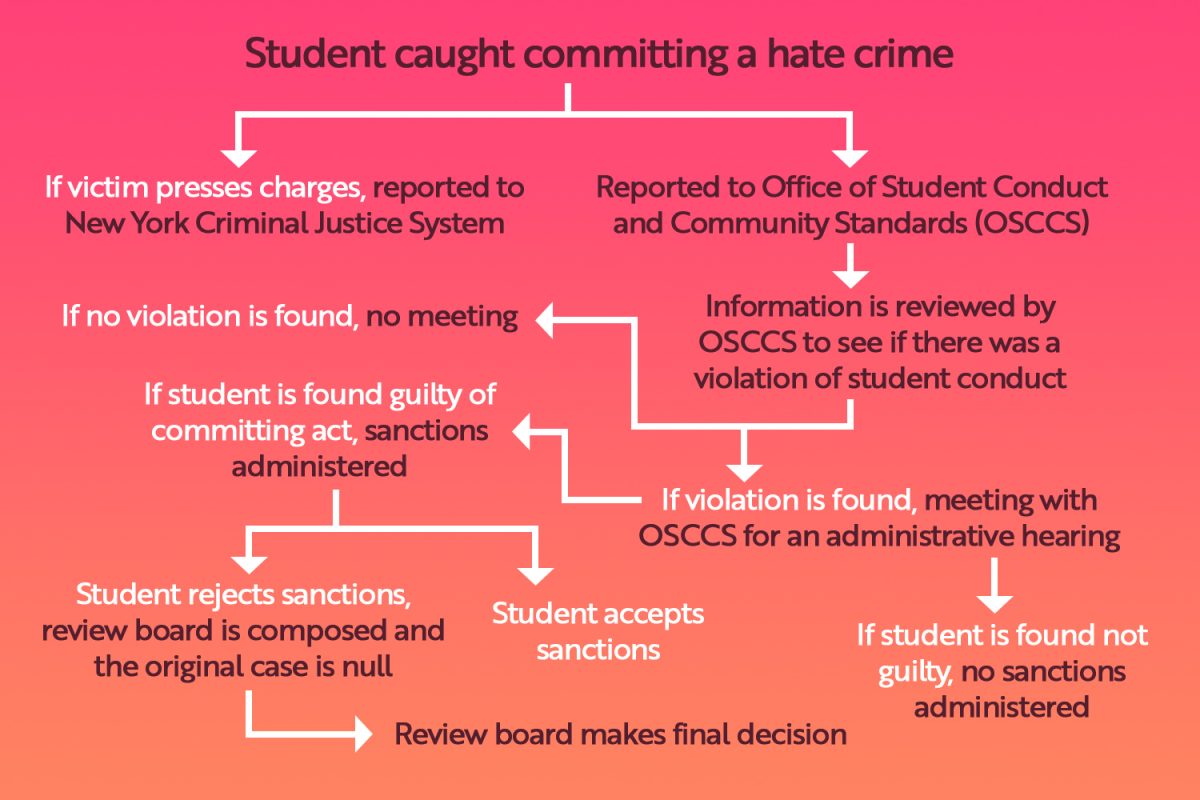From 2022 to 2024, there were nine hate crimes reported on campus at Ithaca College. As of March 6, the only case where further action has been taken was regarding an incident report on Jan. 19.
A swastika was found drawn in the frost in the Baker Walkway windows on Jan. 19. After an investigation from the Office of Public Safety and Emergency Management (OPS), an individual was apprehended and referred to the Office of Student Conduct and Community Standards (OSCCS).
Thomas Dunn, director and deputy chief for OPS, said he could not comment on how the individual was caught because the investigation is still open. Dunn said the OPS investigates a crime but cannot prosecute a student; that is up to the Office of Student Conduct and Community Standards (OSCCS).
The OSCCS has no formal policy for investigations of hate crimes. Laura Davis, director of Residential Life and Judicial Affairs, said a hate crime would be investigated around bias and “personal respect and safety” which is described as an action or situation involving assault or abuse including harassment, intimidation or other conduct that endangers or threatens the safety of a person on college property.
OPS investigations and steps taken to prevent hate crimes
Dunn said there is a two-track system for students who are caught committing a hate crime at the college.
“One would be through [the OSCCS] and the other would be through the New York state criminal justice system,” Dunn said. “In New York state, there’s penal law violations — like punching someone and causing injuries is what we consider assault.”
Dunn said that if a hate crime is committed against an individual, the victim would have to decide to press charges.
“The [student] conduct side [is] if we identify someone with a preponderance of evidence that that person was responsible for the act of some type of crime, we would send [that] to [OSCCS],” Dunn said.
Elyse Nepa, assistant director for the Clery Act and Prevention Education for the Office of Public Safety, said that after the increase in hate crimes on campus in 2022, OPS took a multifaceted approach to combat hate crimes on campus.
“We increased our prevention education, collaboration, security, we did kind of a total overview of what [our processes] looked like because the frequency was so high in early 2022 and the location was relatively targeted,” Nepa said.
In 2022, every hate crime reported on campus was an incident of destruction/damage/vandalism of property on campus, characterized by religious bias. In October and November 2022, five swastikas were drawn or carved into surfaces on campus. Four were found in The James J. Whalen Center for Music and one was found in the Kosher Korner in Terraces Dining Hall.
Nepa said vandalism is more challenging to investigate unless a person witnesses the event directly.
“There’s no way of telling who was where at what time and when [vandalism] showed up,” Nepa said. “Sometimes we will get a report and it could have happened two weeks ago or 14 months ago and then we’ll get a report. … If there’s that long of a delay in receiving information it’s hard to respond in a way that will be able to identify a perpetrator.”
Dunn said the motives for hate crimes through vandalism are also difficult to investigate.
“We assume some of those crimes are against a person of a specific religious [background] but as you know with the Nazi symbol, the Nazis didn’t like a lot of people,” Dunn said. “So if it’s just a random Nazi symbol, is it directed at a certain identifying person? The campus police can’t really determine what the motive was.”
Davis said that once OPS completes an investigation and compiles information on a case, OPS will send a report to the OSCCS to review the information and assess to see what the next steps are for the hearing.
Student Conduct and Community Standards Process
Davis said the standard hearing process for a student who commits a hate crime would be the standard process for referral to the Office of Student Conduct and Community Standards.
“Once a referral is made regarding an incident, that information is reviewed,” Davis said. “Based on the information in the [referral], there’s a determination as to if there were any alleged behavior that could potentially be a violation of the rules and regulations, which [refers] to residence halls, or the code of conduct.”
Davis said that if there is a violation of the rules and regulations or the code of conduct, a member of the OSCCS or a designee from the Office of Residential Life would reach out to a student to set up a time for an administrative hearing.
“Ultimately, that’s a conversation between a student or students involved trying to better understand the nature of an incident, involvement of an incident, just really talking through it,” Davis said.
Davis said the person conducting the administrative hearing would make a decision based on a “preponderance of evidence,” which Davis said is a decision decided on if the student is more likely than not to have broken the rules and regulations or the code of conduct.
“The goal of [OSCCS] is that it’s an educational process,” Davis said. “So then we would look at sanctioning and that is proportional outcomes related to the behavior that person was found responsible for. Obviously, that can vary.”
Davis said hate crimes are taken very seriously in the Office of Student Conduct and Community Standards but said she could not provide specific punishments for hate crimes. Once a student has been found responsible for violating the code of conduct, OSCCS takes the seriousness of the act, the impact to the community and the student’s history of prior conduct into account.
“It is not uncommon that if a person is found responsible for a behavior that we would be seriously exploring the student’s status at the college, which could mean a bunch of things,” Davis said. “But it’s so varied based on the nature of the incident.”
Davis said that there is nuance in every student conduct case and that it is beneficial to the student when the case is being taken into careful consideration, so the student is not given sanctions unfairly.
Davis said the goal is to be as timely as possible with cases to benefit the student involved because code of conduct violations can be a stressful time for students involved in the conduct process.
“[The cases] may [take] a few days to a week,” Davis said. “Then depending on the nature of [if] we are assigning a specific case to a specific person to have the hearing. The goal is to move as quickly as we can.”
Davis said that when a student receives an outcome letter, students have three business days to request to be seen by a review board made up of three to five student, staff and faculty board members. If a student chooses to be seen by a review board, the original hearing is deemed null and void and the student will continue without sanctions until after the review board has made a decision for sanctioning.
“The goal is to typically have a board within the next couple of weeks,” Davis said. “It takes a bit more time because we are then soliciting board members who are trained across campus and coordinating [their] schedules.”
Davis said the OSCCS recognizes complexity in cases because the college is an educational institution.
“If we were just going to make snap judgments, we wouldn’t have meetings [and] we wouldn’t have dialogue,” Davis said. “It can be hard for students going through [this] process because it can certainly be stressful, but it is important we are taking every event seriously.”
















